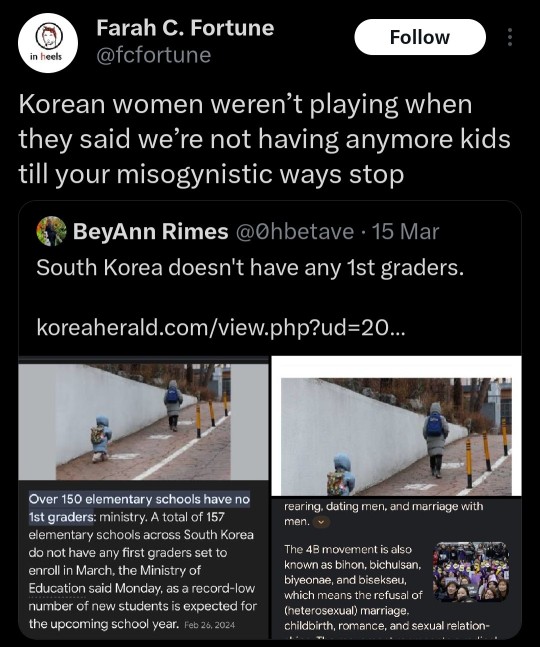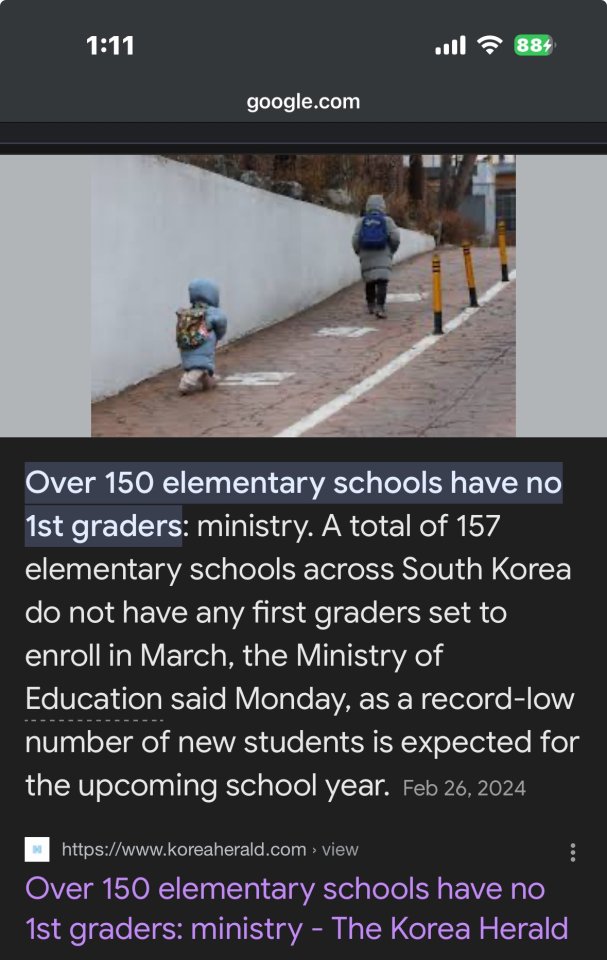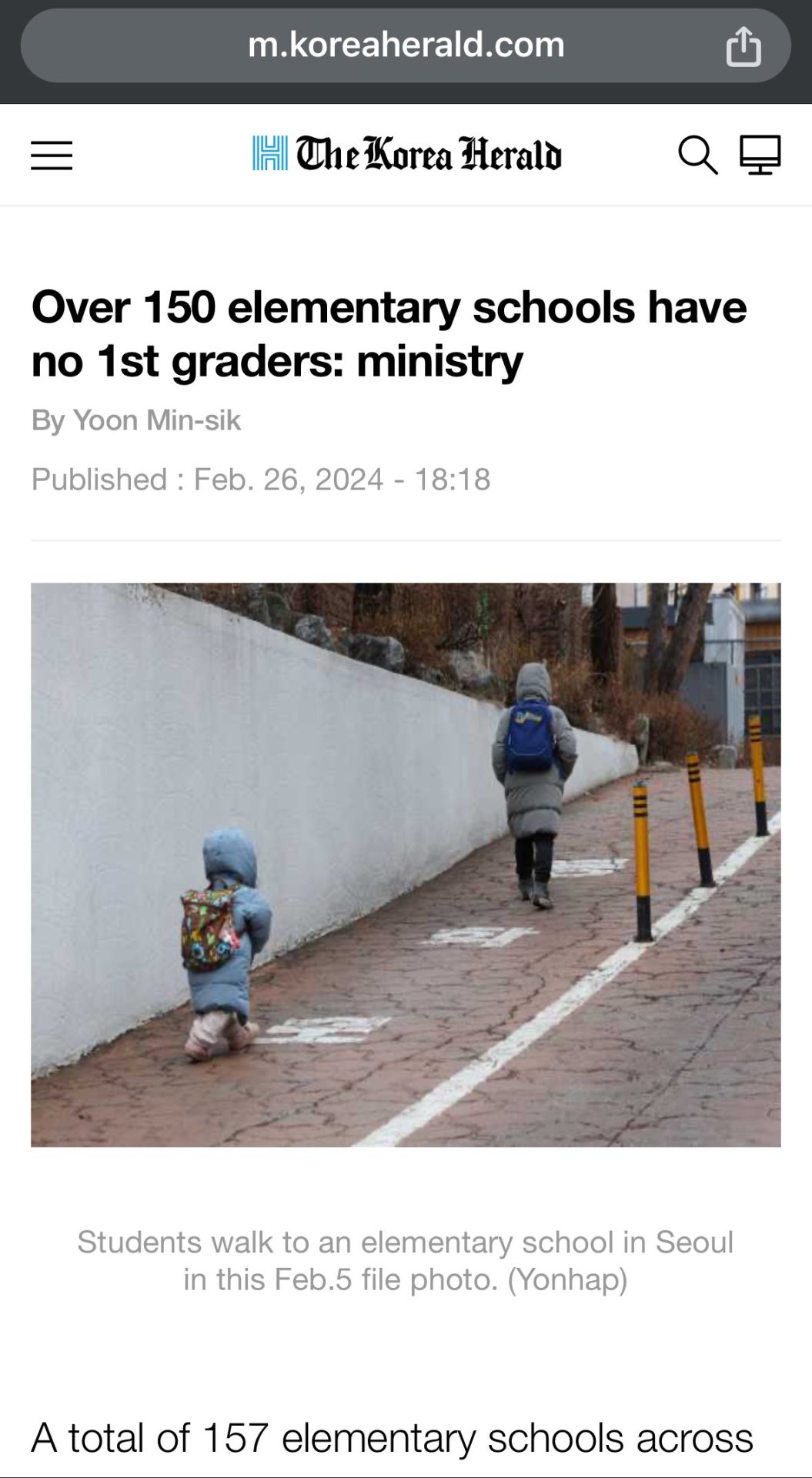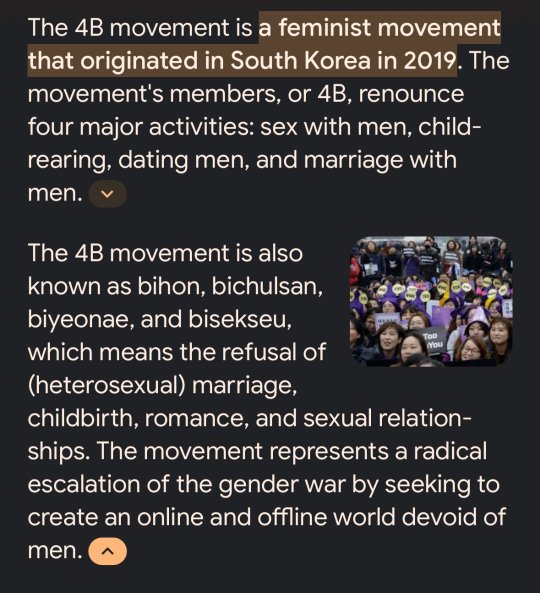#South Korea 4B movement
Explore tagged Tumblr posts
Text




55K notes
·
View notes
Text
The Evolving Dynamics of Women in Politics and Society
Women and the Political Landscape: A Shifting Dynamic If there’s one political advertisement that encapsulates the peculiar tensions between men and women during this election cycle, it has to be the one narrated by Julia Roberts. The ad portrays a woman who arrives at the polls with her husband, yet experiences a solitary moment in the voting booth. As she contemplates her choices, she exchanges…
#celibacy#dating apps#election#feminism#marriage disillusionment#politics#self-partnered#social media activism#South Korea 4B movement#Trump presidency#women
0 notes
Text
I need people to stop glorifying the 4B movement in Korea, from a Western (white) perspective. Stop it. If you are blissfully unaware of this (having not been on TikTok) - in theory, it makes sense. No sex with men, no dating men, no child rearing with men, and no marriage with men. But. BUT. Feminists in Korea are problematic AF. I know this from both personal experience (having been on the receiving end of their ire online) and everything I've read about them, in Korean. I see all these white TikTokers (and even some in the Korean diaspora) fawning over how "we" in the US need this and, no. If your feminism is transphobic, hates gay men, hates men in general, that's not the feminism I'd endorse. Why is Korean feminism transphobic? In 2020, Korean feminists ACTIVELY CAMPAIGNED AGAINST a woman who was accepted to Sookmyung University. An all womens' university. But she was a woman, you say. What could be their problem? According to Korean feminists, they didn't want a "man" in their space. Because she is a trans woman. This is not unusual for Korean feminists. Having lived there for 5 years, to some extent, I understand their anger against misogyny. But if you are truly against the toxic patriarchy that exists in Korea, you must also help dismantle military conscription because that is where a lot of men become radicalized, bullied, etc etc and "grow up" to be the most toxic form of men seen on this earth. But Korean feminists don't give AF about that and in fact, I've read a lot of them express that it's good for men to suffer. Guess what? That view is internalized misogyny and toxic patriarchy, too. And I don't want to hear it about the movement being so "young". Korean women have stepped up to the plate before in our history. We are capable of better than this fucking nonsense. It's a bunch of transphobic, gay hating radicals that have hijacked what was supposed to be about social justice. WOMAD (link is to the Wikipedia article, not their site) and Megalia are the two sites they stem from. It is the most toxic group of people I've ever had the displeasure to encounter online. Any form of criticism is, at best, ignored and worst - I've been "called out" for being Korean-American, and therefore, to "butt out" of "Korean issues". Amongst other bullying I've personally received. And yes, not just on forums but on public articles that I've commented on.
I know it's a catchy title and it appeals in theory but please, please do not glorify these transphobes and TERFs. They don't deserve your attention.
8K notes
·
View notes
Text

Don't cry, we'll erase your porn. Don't kill yourself, we'll protect you. We'll fight for you.
ağlama, senin pornonu sileriz. kendini öldürme, seni koruyacağız. senin için savaşacağız
#radblr#radical feminism#radfeminism#korean#south korea#4b movement#feminism#radical feminist safe#radical feminist community
1K notes
·
View notes
Text








865 notes
·
View notes
Text
Something happened in my English class that I think perfectly sums up how so many people don't understand feminism.
At the beginning of each class, we have to talk about something in english for two minutes. This woman decided to talk about radical feminism in South Korea. She explained how feminists there decide not to date men, have sex with men, marry men and have kids with men anymore. It was very interesting and well explained, and I was happy to see another woman from my uni talking about feminism. From what I understood, she's not Korean but goes to Korea often and has a lot of radical feminists friends there.
Then another woman raises her hand and asks "don't you think these rules are a little bit tough?". I roll my eyes, but the other woman is confused. She frowns. "What rules? What are you talking about?". "I mean, the not dating men rule. Isn’t it a bit too tough?". "Well of course it's tough for the men but that's the goal isn’t? Feminism has to be a bit tough to men in order to work". She really didn't seem to understand what that other woman meant, and the other was apparently confused about it. "I mean for the women... for the Korean women. Aren't these rules too tough for Korean feminists? Isn’t there a way to help women without giving them such hard rules to follow?".
I was very annoyed (so was the woman who talked about this movement in the first place) because how can you miss the point so badly? How does she think feminism works? Does she believe some sort of higher power gives Korean women rules to follow and that they get thrown in jail if they date a man? How can you describe this movement as "rules"? They aren't rules. They would be rules if Korean women were forced to obey them, if they were punished for dating men. That's not the case. What's happening is that some women decide of their own free will to stop dating men (among other things). They don't follow any rules, they freely chose to do what they do. It's about women's freedom, about women deciding what they do with their life and body. But I guess people nowadays use this concept only to defend prostitution and makeup, without understanding it in reality, when it comes to women doing things that go against what the patriarchy wants them to do.
Anyway, I find it interesting that this woman's first conclusion was that these were rules rather than free choices. This is why many people see radical feminism as a cult; they can't understand the idea of women making their own choices if those choices defy patriarchy. They think we must be some kind of cult that brainwashes them and forces them to obey and follow complicated rules, because how else can a woman decide to stop fucking men? A free woman would never do that.
#radblr#radical feminism#radfem safe#radfem#radical feminist safe#radical feminists please touch#radical feminists do touch#rad fem#radical feminist#radical feminists do interact#4b movement#korean feminism#korean radfems#feminism#women's rights#feminist#korea#south korea
1K notes
·
View notes
Text

I honestly adored this movement from the moment I learned about it a few months ago and I have so much respect for the girlies across the world participating
371 notes
·
View notes
Text
i love how westerners try to present 4b movement as so incredibly influential in korea when in reality no one in korea has even fucking heard about that. it's literally more popular in US than it is in korea. i've recently watched a video made by a youtuber who has lived in korea for way over a decade and she made it because a journalist from our country asked her about this movement after reading about it in the western press and she was completely dumbfounded and had no idea what the fuck that was. none of her friends did either lmao.
this is westerners again trying to construct some narrative and use a foreign country for their own political battles. and now braindead radfems are running with this bullshit and spreading it all over the internet and trying to claim that low birthrates in korea are somehow the result of a movement that pretty much nobody in korea even knows about. it's amazing. how dumb do you have to be. there are myriads of substantial issues that contribute to this and not this made up thing. japan's had extremely low birthrates for a very long time now too.
447 notes
·
View notes
Text
A lot of those bros who embraced Trump may soon become incel bros.
Apparently the "4B" movement has crossed the Pacific from South Korea.
To explain 4B, this is from Elle...

McKenna, who did not want her last name published for privacy reasons, first heard about 4B a few months ago, via a TikTok video referring to the South Korean social movement. The basic idea: women swear off heterosexual marriage, dating, sex and childbirth in protest against institutionalized misogyny and abuse. (It is called 4B in reference to these four specific no-nos.) The mostly online movement began around 2018 protests against revenge porn and grew into South Korea’s #MeToo-esque feminist wave. In the wake of Trump’s victory, 4B is once again on McKenna’s mind – and she’s not the only one.
Trump’s embrace of manosphere figures such as Joe Rogan, the Nelk Boys and Adin Ross means he has strong support among their evangelists – mainly, young men. But for young women, the former president’s long history of misogyny means a vote for Trump is a vote against feminism, especially with reproductive rights as a key issue in 2024. Ahead of the US election, pundits predicted a history-making gender gap, and early exit polls support that prediction: women aged 18-29 went overwhelmingly left, while Trump picked up ground with their male counterparts compared with 2020. With the race called, TikToks viewed hundreds of thousands of times offered one way for women to go for the jugular: 4B, specifically cutting off contact with men. “Girls it’s time to boycott all men! You lost your rights, and they lost the right to hit raw! 4b movement starts now!” one creator wrote on TiKTok in a video viewed 3.4m times.
B4 began in South Korea to protest blatant misogyny. It grew when South Korean bros helped to elect a misogynistic president.
In South Korea, 4B began as an offshoot of national protests against the spycam epidemic, in which perpetrators filmed targets – most of whom were women – during sex or while urinating in public bathrooms without their knowledge or consent. “These videos were sold and exchanged by men on Discord, and women didn’t know how many men had taken part, and if any of the men in their lives had,” said Min Joo Lee, an assistant professor of Asian studies at Occidental College. “There was a general sense of, ‘Who can I trust? And before I regain my trust in men, I need to refrain from contact with them.’”
Voyeurism is something Trump is famous for.
4B happens at a time South Korea is experiencing a drop in its fertility rate. So women are operating from a position of strength. Of course fertility fanatic Elon Musk is appalled by B4.
South Korea’s fertility struggle caught the attention of the vehement Trump ally Elon Musk. The Tesla CEO has at least 11 living children (one son died in infancy in 2002). He describes pronatalism, the enthusiastic promotion of reproduction, as a way to save humanity from “population collapse”. When Taylor Swift came out in support of Kamala Harris this summer, he seemingly offered, creepily and unprompted, to get her pregnant. He’s propped up South Korea’s declining fertility rate as a case study for Americans who do not get busy making babies. Consider Musk an archetypical 4B foe. He’s far from the only one. Far-right figures such as Nick Fuentes, a white supremacist who has praised Hitler and once described his “ideal wife” as 16 years old, celebrated on X after Trump’s win, tweeting, “I’d just like to take the opportunity to thank men for saving this country from stupid bitches who wanted to destroy the world to keep abortion,” and, “Your body, my choice. Forever.” That sort of violent rhetoric, which is spreading among Trump’s far-right supporters, will not exactly convince the majority of young American women they should be dating at the moment.
Musk's worry about "population collapse" is contrived and probably racist. What he really wants is higher white fertility.
We're in no danger of our species going extinct unless we make the planet unlivable. There are currently 8.1 billion humans. Even if that were cut in half, that would leave us with more humans than there were in 1974; they seemed to do just fine back then with ABBA and Gerald Ford.
So women, do whatever it takes to secure your rights. At the very least, discriminate in favor of guys who donated to Harris-Walz before November 5th.
#4b#4b movement#south korea#misogyny#women's rights#donald trump#trump bros#elon musk#fertility#nick fuentes#yoon suk-yeol#윤석열#대한민국#여성혐오#election 2024
102 notes
·
View notes
Text
Alaina Demopoulos at The Guardian:
McKenna, who is 24 and lives in a rural, conservative state, recently got back on dating apps after a year of finding herself. She had two first dates planned for this weekend, but after Donald Trump won the election, she cancelled both. “It’s heartbreaking to know that in this country you only matter if you’re a straight white man,” she said. “It’s just devastating that we’re at this point. So I will not let another man touch me until I have my rights back.” McKenna, who did not want her last name published for privacy reasons, first heard about 4B a few months ago, via a TikTok video referring to the South Korean social movement. The basic idea: women swear off heterosexual marriage, dating, sex and childbirth in protest against institutionalized misogyny and abuse. (It is called 4B in reference to these four specific no-nos.) The mostly online movement began around 2018 protests against revenge porn and grew into South Korea’s #MeToo-esque feminist wave.
In the wake of Trump’s victory, 4B is once again on McKenna’s mind – and she’s not the only one. Trump’s embrace of manosphere figures such as Joe Rogan, the Nelk Boys and Adin Ross means he has strong support among their evangelists – mainly, young men. But for young women, the former president’s long history of misogyny means a vote for Trump is a vote against feminism, especially with reproductive rights as a key issue in 2024. Ahead of the US election, pundits predicted a history-making gender gap, and early exit polls support that prediction: women aged 18-29 went overwhelmingly left, while Trump picked up ground with their male counterparts compared with 2020. With the race called, TikToks viewed hundreds of thousands of times offered one way for women to go for the jugular: 4B, specifically cutting off contact with men. “Girls it’s time to boycott all men! You lost your rights, and they lost the right to hit raw! 4b movement starts now!” one creator wrote on TiKTok in a video viewed 3.4m times. In another video, a woman exercises on a stair climber machine. “Building my dream body that no man will touch for the next 4 years,” reads the caption. The top comment on her post: “In the club, we all celibate.” On Wednesday, Google searches for “4B” spiked by 450%, with the most interest coming from Washington DC, Colorado, Vermont and Minnesota. In South Korea, 4B began as an offshoot of national protests against the spycam epidemic, in which perpetrators filmed targets – most of whom were women – during sex or while urinating in public bathrooms without their knowledge or consent.
[...]
As with #MeToo in the US, men have called 4B an overreach, and discriminatory. South Korea’s conservative president, Yoon Suk Yeol, ran on a platform of abolishing the Ministry of Gender Equality and Family, which protects against gender-based violence and discrimination, saying feminists were to blame for the country’s economic woes.
Haein Shim, a South Korean activist and current undergraduate researcher at Stanford University’s Clayman Institute for Gender Research, said in an email that women who participated in 4B protests faced cyberbullying, harassment, stalking and threats of violence. “Many of us wore masks, sunglasses, and hats to cover our faces, and it was common practice to dress differently before and after a protest to minimize being stalked.” There were more nuanced critiques, too. “Some debated if it was a sustainable way to participate in feminism, because it was a total disconnect with men, and some people believe there have to be productive conversations among people with different world views in order for society to move forward,” Lee said. Feminists expressed concern over whether 4B “disregarded heterosexual women’s desires, in order to punish men who may or may not have participated in misogyny”.
Shim, the activist, says that 4B goes beyond just boycotting men, and encourages women to find solidarity with each other. “It’s a new lifestyle focused on building safe communities, both online and in-person, and valuing our existence in this crazy world,” she said. “What we want is not to be labeled simply as some man’s wife or girlfriend, but to have the independence to be free from the societal expectations that often limit women’s potential to be fully acknowledged as human beings.” Second wave feminist groups of the 1960s and 70s such as Cell 16, which advocated celibacy and separation from men, and political lesbians, who opted out of heterosexuality, were historically deemed as extreme – or simply trendy. 4B, a more contemporary movement that mostly lives online, may seem more accessible to gen Z women. On TikTok, 4B posts play as communal and therapeutic, a way to take back control during a time when basic rights are at stake.
Donald Trump's election, combined with the erosion of abortion access post-Roe, has fueled an angry backlash among feminist-inclined women by importing the South Korean 4B Movement to the States.
#4B Movement#Feminism#Kamala Harris#Donald Trump#Dating#South Korea#United States#2024 Presidential Election#2024 Elections#Misogyny#MeToo
39 notes
·
View notes
Text


experience from a feminist female student in South Korea.
84 notes
·
View notes
Text
And still, non-Koreans talking about 4B like they know shit.
And I'm freaking still irked. Look, you can't say that you "researched" and "know a lot" and "But what about the current state of 4B." without actually knowing the history of women's rights in South Korea and talking DIRECTLY about how much the US imperialism turned women's rights in South Korea to utter shit, and that does include LGBTQIA rights. So before you make another video essay on 4B and OMG, Koreans are doing this or that, take a breath, BACK THE FUCK UP, and freaking research and go back to at least, at least the Imjin war. Talk about how the US invaded Japan and contributed sharply to the loss of women's rights in South Korea, indirectly and directly. When you can show a grasp from the Imjin war to the present and how much the US and UK fucked up Women's rights in South Korea, then you can talk shit about 4B and what they stand for. And fucking talk about the results, yo. Talk about what happened as a result.
Yes, I know, it's a lot of war violence, like of SV and SA. But how can you appropriate and talk like you know anything about Korea and take civil rights movements when you won't own how much your country fucked up my country making me adopted? Hmmm? 'cause 100% these things are linked in history. But you won't own it and rather talk about OMG, 4B is anti-trans (I sit here as an NB) and things like OMG, 4B did this. *eyeroll* Yes, yes, after you fucked up my country. Own it. Own it as a PoC who isn't Korean. Own it. 'cause I work hard to own the shit the US did to your country even if I didn't choose to be adopted to the US.
Look, I'm asking you to own the imperialism so there is a shared responsibility for the fuckery and you don't say Oh, those crazy South Koreans. You created part of the mess, you fucked it up, you own it and then you can talk your hyperbolic pandering shit.
#4B#4B movement#South Korea#cultural appropriation#own imperialism before you talk shit about other countries
14 notes
·
View notes
Text
the west needs a 4b movement that ISNT transphobic
no sex
no dating
no children
no marriage
with ANYONE who voted for or supports trump's ideologies and fascist policies bc there are a LOT of stupid white women who voted for that shit
ostracize those mfing weirdos!
#uspol#4b movement#whats the tag for south korea pol?#ALSO girl gangs to beat up r@pists#all im saying is as long as your partner isnt a fascist#u can have all the gay sex you want#no marriage or children though#just to spite the natalists
11 notes
·
View notes
Text
[…] “The basic idea: women swear off heterosexual marriage, dating, sex and childbirth in protest against institutionalized misogyny and abuse.”
10 notes
·
View notes
Text








In 2024 we now have the “put girls in school earlier idea”, in 2017 there was the “influence accomplished women to marry less accomplished men plan/conspiracy” and in 2016 there was the “Fertility Map” that showed the density of areas populated by women from age FIFTEEN to 49. Of course none of this shit works because it’s typically to the detriment of women and it operates under the assumption that women are the ones that need to change to “fix” the “problem”. Why not target the men, their violent misogyny, their reactionary antifeminism, their extremely high rates of domestic abuse, their spycam pornography that has lead women to kill themselves? Why not try and fix your famously dogshit wage gap? Why isn’t the extreme and violent pervasive misogyny treated as serious (if not more) a problem as the fertility rate, and as one of the main causes of it? imo the fact that we do not see these issues very seriously considered but rather have the focus shifted to changing women shows that the men and government of the country see this misogynistic terrorism as patriarchal society working as intended. Women’s deaths are acceptable collateral for men to stay in power and the fear they live in is crucial for maintaining this power. Again these plans and ideas aren’t random, they are literally coming from government agencies and “research” institutions. The current president is a staunch antifeminist and appealed to these misogynists in order to secure their votes. if those in power wanted to do something about these issues, they would. It’s like how the police didn’t give a shit about the female victims of molka but the second a woman did it to a man it was all hands on deck with the swift and harsh punishment. This event laid bare the extreme misogyny present throughout society for many South Korean women and lead to huge protests and feminist awakenings. imo this also shows the power of seeing a “mirrored” situation in regards to the huge disparity of how the sexes are treated.
60 notes
·
View notes
